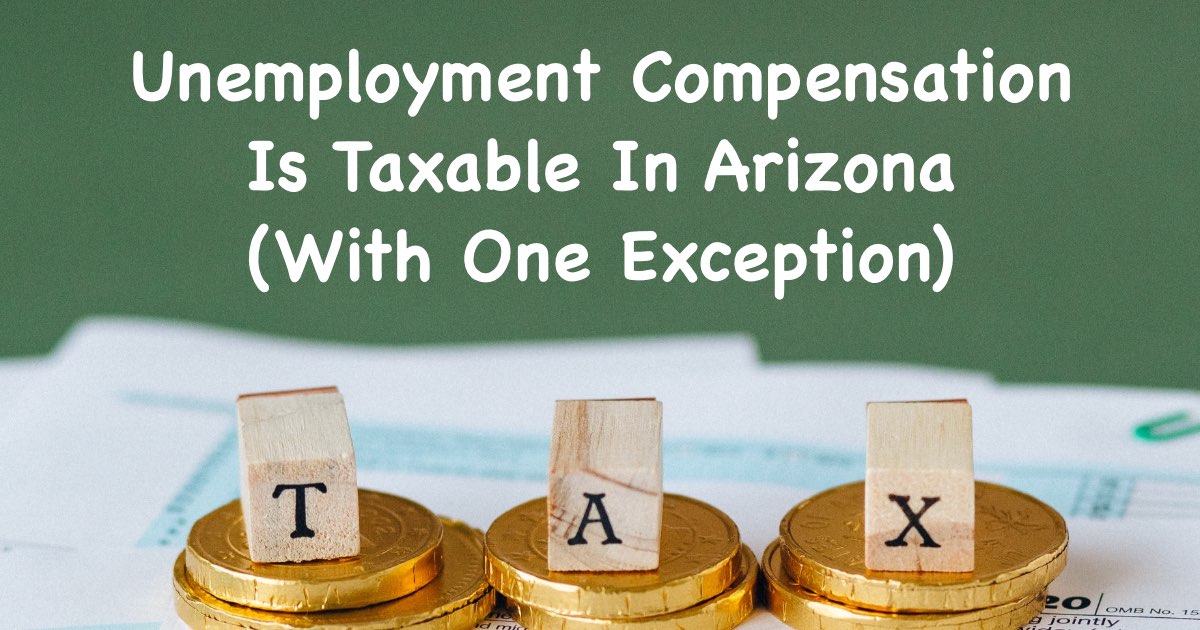
One of the effects of the COVID pandemic has been that many more people became reliant on unemployment compensation and benefits. At the same time, the unemployment benefits significantly increased due to the passage of the CARES Act and other similar laws. It was a surprise to many recipients of unemployment benefits to find out that unemployment compensation is taxable. In other words, unemployment compensation is considered income, and is taxed the same way as other income, both by the federal government and by the state.
Moreover, before the pandemic, unemployment compensation in Arizona was limited to $240 per week, putting a person who received the maximum unemployment slightly below the national poverty threshold. Unemployment compensation was further limited to 26 weeks. This meant that, as a practical matter, taxation of unemployment benefits was never really an issue, because people receiving poverty level income generally have no income tax liablility. But with the increase in unemployment benefits due to the pandemic, Arizona residents could receive over $800 per week, and as of 2021 are still eligible to receive over $500 per week. All of a sudden, the potential taxes owed on unemployment benefits became a real concern.
What Types of Unemployment Benefits Are Taxable?
Generally speaking, all types of unemployment benefits are taxable as income. These include regular unemployment insurance, Arizona Extended Benefits (EB), Federal Pandemic Unemployment Compensation (FPUC), Pandemic Emergency Unemployment Compensation (PEUC), Pandemic Unemployment Assistance (PUA), Lost Wages Assistance (LWA), CARES Act benefits, and Trade Adjustment Assistance (TAA).
The Arizona Department of Economic Security reports unemployment compensation to the Internal Revenue Service, and the information is also transferred to the Arizona Department of Revenue.
Are There Any Exceptions to Taxation of Unemployment Benefits?
There is currently only one exception to taxation of unemployment benefits. The American Rescue Plan, passed in March 2021, makes a portion of unemployment benefits free from federal taxation. Specifically, the first $10,200 of 2020 unemployment compensation is now tax free. If your spouse also received unemployment and you file a joint tax return, each of you can exclude from taxable income up to $10,200 received in unemployment benefits.
This benefit applies only to households with a modified adjusted gross income under $150,000. It is important to note that this limit is not affected by the size of the household, whether the person filing is married, or whether the spouses file a joint tax return. Therefore, if you received unemployment compensation in 2020, but your and your spouse’s combined modified adjusted gross income was $150,000 or more, you should speak to your tax advisor to determine if filing separate tax returns would allow you to qualify for the unemployment compensation tax break.
The tax break applies only to federal taxation. As of the end of March 2021, Arizona has not yet followed the federal government in eliminating state income taxes on unemployment benefits.
Furthermore, the tax break only applies to 2020 unemployment benefits. It may be possible, however, that Congress will eventually pass a law providing a similar tax break for the 2021 tax year.
Can Taxes on Unemployment Compensation Be Spread Out to Avoid a Large Tax Bill at the End of the Year?
The answer is yes. In order to avoid a large tax bill at the end of the year, you can have income taxes deducted from each of your unemployment checks. You may choose to have federal income taxes withheld from unemployment compensation at the rate of 10% of the gross weekly unemployment benefit. To do so in Arizona, you will need to fill out Voluntary Election for Federal/State Income Tax Withholding form (Form UB-433). By using the same form, you can also have state income taxes withheld from you unemployment compensation. State income taxes are withheld at the rate of 1% of the gross weekly unemployment benefit.
It should be noted that state income taxes cannot be withheld from the supplemental unemployment compensation you may receive under the Lost Wage Assistance or the Federal Pandemic Unemployment Compensation. However, because state income taxes are much lower than federal taxes, they should not create a significant liability even if they have to be paid at the end of the year.
What Can I Do If I Already Have a Significant Tax Liability for Unemployment Benefits?
If you have a significant tax liability for unemployment benefits even after the applicable tax break, then you do not want to ignore it. Income tax liabilities can follow you for years, and can result in adverse actions, such as the imposition of a tax lien. If you are unable to pay the tax liability at once, the IRS offers various payment plans and installment agreements that may allow you to pay over time. If you have to decide between paying taxes or paying other debt like credit cards, generally the tax debt should be paid first. The reason is the special treatment given to taxes under the law. In fact, if you have overwhelming debt, a Chapter 7 bankruptcy may allow you to eliminate the majority of that debt. Tax debt, on the other hand, is much more difficult to eliminate in bankruptcy. However, if you are unable to pay your taxes, and are unable to reach an acceptable agreement with the IRS or the state taxing entity, Chapter 13 bankruptcy can allow you to pay your taxes over a period of up to five years.
Get Assistance with Your Tax Liabilities and Other Debts
At Yusufov Law Firm, we have regularly assist clients with resolving tax obligations and other debts. We offer a free no-obligation evaluation of your case, and can both advise you of your options, and assist you in pursuing the option you choose. You can contact us online at any time, or call 480-788-0098 in Phoenix/Mesa, or 520-745-4429 if you are in the Tucson area.

